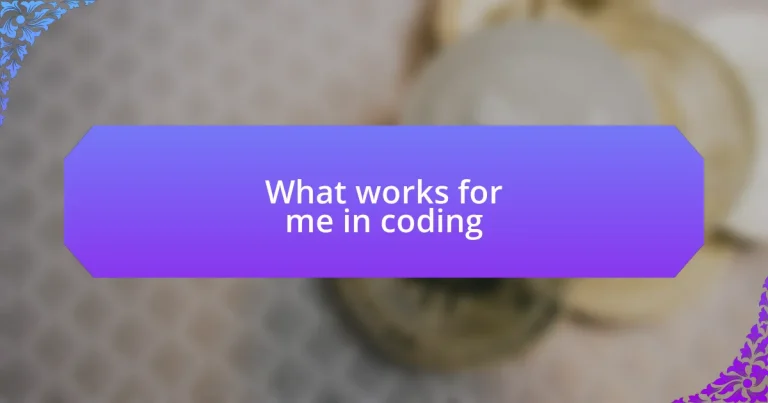Key takeaways:
- Early struggles with coding loops led to significant breakthroughs and enhanced resilience.
- Implementing key principles like consistent naming conventions, commenting, and testing greatly improved coding effectiveness.
- Utilizing tools such as Visual Studio Code, Trello, and GitHub has streamlined productivity and collaboration.
- Continuous learning through online platforms, books, and mentorship has been crucial for personal development in coding skills.

Understanding My Coding Journey
During my early coding days, I vividly remember struggling to grasp the concept of loops. It was frustrating when the code didn’t behave as expected, but that moment of breakthrough when I finally understood them felt like winning a small victory. Have you ever felt that exhilarating rush when a problem clicks into place?
As I delved deeper into different programming languages, I realized that each one shaped my thinking in unique ways. My journey through Python’s simplicity and Java’s structured approach opened my eyes to the versatility of coding. It’s fascinating to consider how these experiences have built my resilience and adaptability as a coder.
One specific project comes to mind—building a personal website from scratch. I poured countless hours into perfecting each detail, and the pride I felt when it finally went live was unmatched. That sense of ownership and creative expression has been a powerful motivator throughout my coding journey, reminding me of why I fell in love with this craft in the first place.
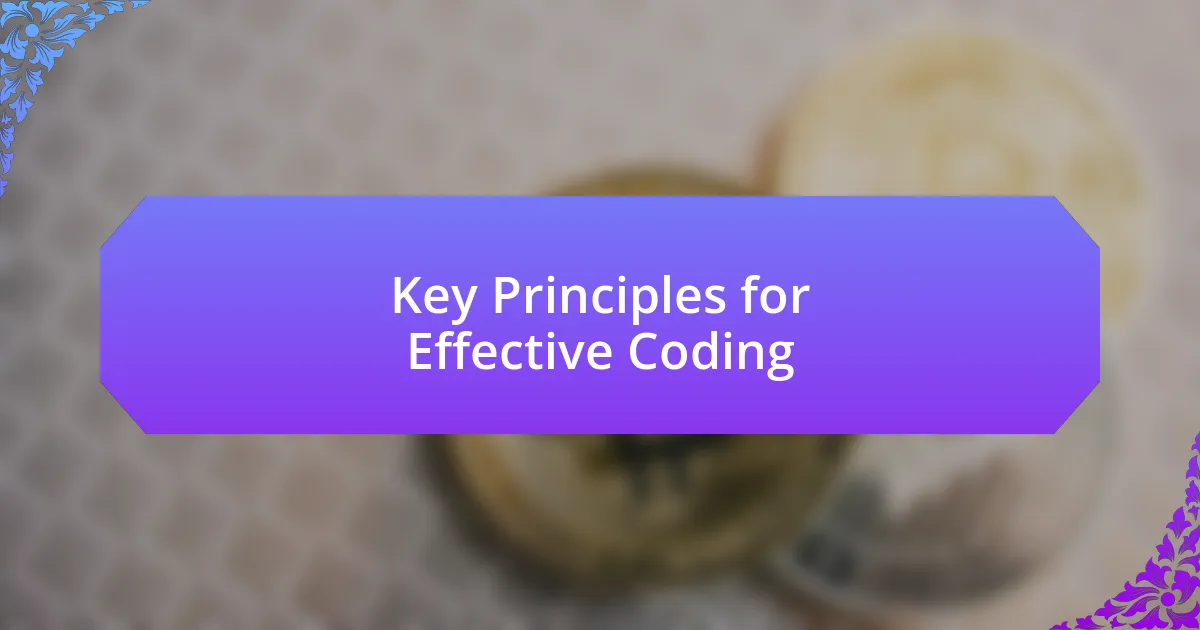
Key Principles for Effective Coding
Key Principles for Effective Coding
When I think about effective coding, I always emphasize the importance of clarity. I recall a project where my variable names were so cryptic that I spent hours trying to remember what each one represented. It was a valuable lesson on the significance of writing code that not only functions well but also communicates its intent clearly. It’s a simple yet profound principle that truly enhances collaboration and long-term maintenance.
Here are some key principles that I find foundational to effective coding:
– Consistent Naming Conventions: This helps keep the code readable and understandable.
– Commenting Code: Briefly explaining complex logic can save time later.
– Version Control: Utilizing tools like Git ensures I can track changes and collaborate efficiently.
– Code Reviews: I’ve learned that having a second pair of eyes on my work often catches errors I might have missed.
– Testing: Regularly testing my code has become a habit that saves me from future headaches, especially in larger projects.
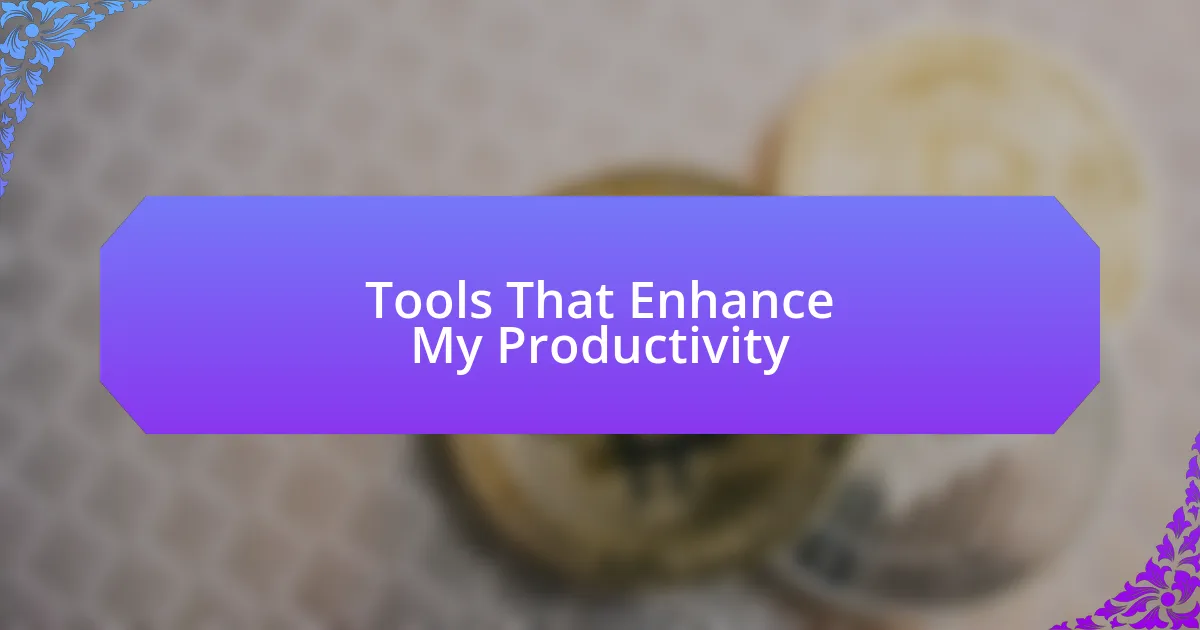
Tools That Enhance My Productivity
When considering tools that enhance my productivity, I can’t overlook the impact of an efficient code editor. I’ve found that using Visual Studio Code transforms the hours I spend coding into more productive sessions. This editor integrates extensions for linting, formatting, and debugging, streamlining my workflow. I remember the sheer frustration of debugging in a less sophisticated editor, and now I appreciate how Visual Studio Code helps catch errors in real-time.
Another tool that has truly changed my approach to coding is Trello. I once struggled to manage multiple tasks across various projects, feeling overwhelmed by the juggling act. This project management tool allows me to visually organize my tasks, ensuring that I stay focused on priorities. Seeing tasks laid out on a board gives me a sense of accomplishment as I move them to the ‘done’ column, motivating me for the next challenge.
Finally, I can’t stress enough the importance of using GitHub in my daily coding life. The first time I pushed my code to a repository was exhilarating; it felt like sharing a part of my world. Now, it not only serves as a backup but also a platform for collaboration. Being able to review and merge changes with ease has made teamwork seamless, and I often find inspiration from open-source projects shared on the site.
| Tool | Benefit |
|---|---|
| Visual Studio Code | Real-time error detection and extensions for efficient coding |
| Trello | Visual organization of tasks to enhance focus and productivity |
| GitHub | Efficient collaboration and version control for projects |

Best Practices for Writing Code
When it comes to writing code, consistency is key. Adopting a coding style guide has been a game-changer for me. I recall my early days of coding, ending up in situations where my variable names were all over the place. It was confusing, not just for others but for me too. By sticking to a style guide, I can revisit my own code weeks later and still understand it, which is so reassuring.
Commenting my code has also proven invaluable. I used to think, “Why comment when the code is clear?” However, I learned the hard way that my future self would appreciate some context. Recently, I revisited a project I hadn’t touched in months, and those few lines of comments saved me hours of confusion. It’s like leaving breadcrumbs for yourself—definitely something I now prioritize.
Lastly, I can’t emphasize enough the benefits of writing tests for my code. I remember a project where I skipped testing, thinking it was unnecessary. Oh, the regret when I had to debug a production issue! Now, I make it a habit to write tests as I go. It feels like a safety net, helping me catch issues before they become a headache. By integrating testing into my workflow, I’ve reduced my stress and increased my confidence in delivering code that works as intended.
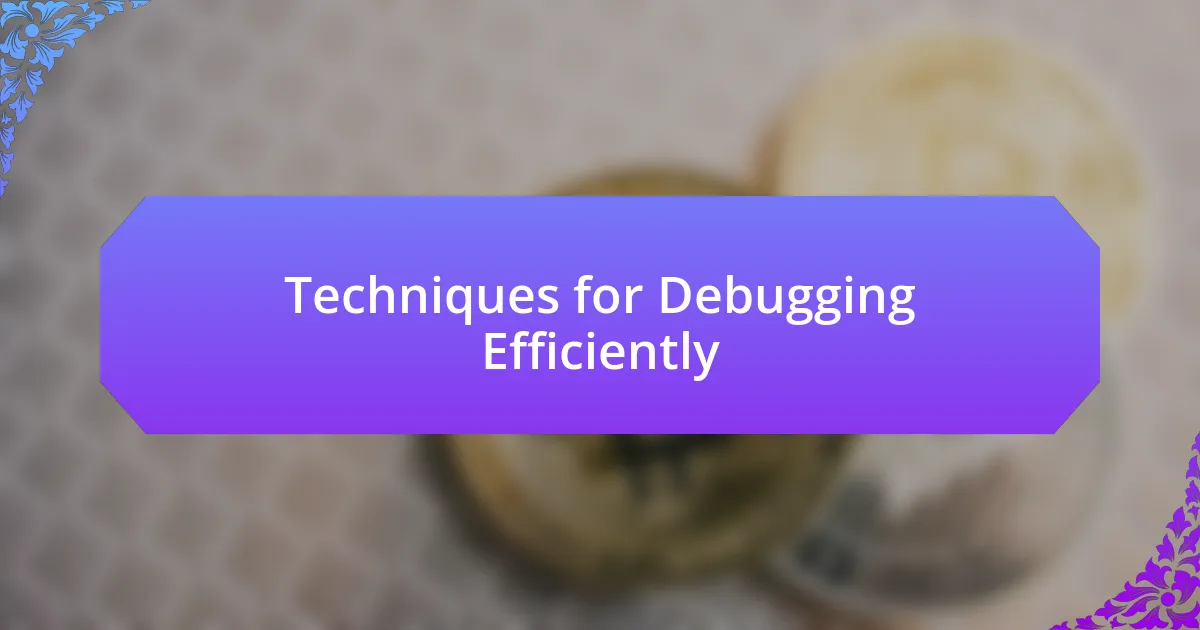
Techniques for Debugging Efficiently
Debugging can sometimes feel like searching for a needle in a haystack. One technique I rely on is using print statements strategically. I distinctly remember a time when I was stuck on a bug for hours, unsure of where things were going wrong. By scattering print statements throughout my code, I was able to track the flow and identify the problem area much more quickly. It’s amazing how a few simple lines can illuminate what’s hidden beneath layers of logic.
Another approach I’ve found effective is to take a break when I hit a wall. There have been moments when I felt overwhelmed, staring at error messages that seemed cryptic. Stepping away for even a few minutes can do wonders. I often return with a fresh perspective, and sometimes the solution jumps out at me. It’s interesting how our brains continue processing problems subconsciously while we take a breather.
And then there’s the wisdom of rubber duck debugging. I used to think it was a silly concept, talking to an inanimate object to solve my problems. But once, in a particularly challenging situation, I explained my code to a rubber duck on my desk, and as I verbalized my thought process, the solution became clear. It made me realize that sometimes, articulating your problem is just what you need to uncover the answers you hold inside.

Learning Resources That Helped Me
Learning resources have played a significant role in my coding journey. One of the most impactful has been online platforms like Codecademy. I remember diving into my first Python course there; I was both excited and intimidated. The interactive lessons allowed me to experiment in real-time, which made the concepts stick much better than traditional textbooks ever could.
Books also hold a special place in my learning. One that stood out is “Automate the Boring Stuff with Python” by Al Sweigart. While going through it, I felt empowered as I learned to automate tasks that had been draining my time. Was there anything more satisfying than watching my scripts run flawlessly? That book not only taught me coding but transformed my daily processes.
Lastly, I can’t stress the value of mentorship enough. Having a more experienced coder to turn to made a world of difference. My mentor would often suggest resources tailored to my specific needs, helping me navigate through the vast sea of information. There were times I felt stuck, but their guidance turned what felt overwhelming into manageable, step-by-step progress. Wouldn’t you agree that having the right support can be a game-changer in learning?
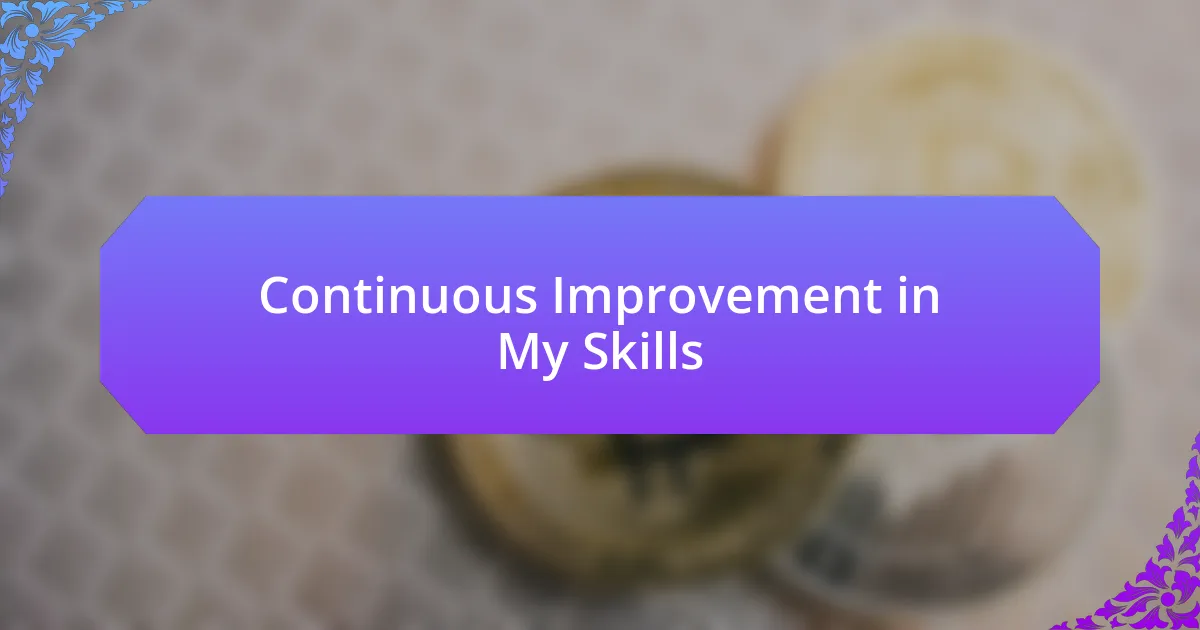
Continuous Improvement in My Skills
Continuous improvement in my coding skills is something I prioritize every day. I often set aside a specific time each week for self-study and experimentation. Recently, I took on the challenge of working with algorithms, and I found myself immersed in problem-solving for hours. The satisfaction of cracking a particularly tricky problem was exhilarating, and it reminded me how rewarding personal growth can be.
I also believe in the power of feedback. I remember sharing my code on a developer forum and receiving constructive criticism. At first, it felt a bit daunting—nobody likes to feel exposed. But you know what? The constructive advice I received transformed my approach to coding. It pushed me to refine my skills and see areas where I could improve, which has been instrumental in my journey.
Moreover, I actively seek opportunities to enhance my understanding of new technologies. For instance, I signed up for a workshop on web development frameworks last summer. The experience was enlightening, and connecting with others who were just as passionate made it even more delightful. Finding my community has not only motivated me but also sparked new ideas for projects I’m excited to explore. Have you ever felt that spark of inspiration just from being around like-minded individuals? It’s truly invigorating.













